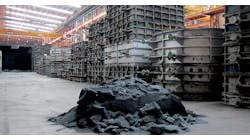The federal Occupational Safety and Health Administration cited and fined Beck Aluminum Alloys for 10 serious safety violations at its plant in Racine, WI, involving handling procedures for liquid chlorine. The violations were discovered during an inspection in February, and after a negotiated settlement agreement the details were released by OSHA this month.
The company negotiated a settlement agreement with the agency that includes a final order of the 10 violations and a fine of $32,890. Also, the company must provide documentation that the safety violations have been abated.
With plants in Racine, WI, and Lebanon, PA, Beck Aluminum Alloys supplies primary aluminum alloys to metalcasters, including automakers. In August, the company sold its Beck Foundry Supply business (now operating as Baker Foundry Supply), though it continues to supply master alloy products.
The Racine plant produces “high-grade, primary-equivalent alloys” in two 160,000-lb. reverberatory furnaces at a reported rate of more than 6 million lb./month.
At its February inspection, OSHA concluded the plant failed to evaluate potential hazards for employees who worked with chlorine, including the impact of power outages on work processes. Also, it said the company did not develop written procedures to minimize employee exposure, and failed to test and evaluate piping used to transfer liquid chlorine, and to implement safe operating pressure limits.
OSHA’s terminology identifies a “serious” violation as one from which death or serious physical harm may result, and which an employer knew or should have known exists.
The violations at Beck Aluminum Alloys were cited under OSHA's Process Safety Management Standards, which contain specific requirements for managing dangerous chemicals in the workplace. Liquid chlorine, a chemical covered under the standards, can cause irritation to eyes, skin, and respiratory systems.
"Exposure to chlorine can have terrible health consequences, and workers must be trained in proper operating procedures to minimize exposure,” according to Christine Zortman, OSHA's Milwaukee area director. “Workers should never be put at risk because a company failed to implement and test controls that would protect them from exposure.”










